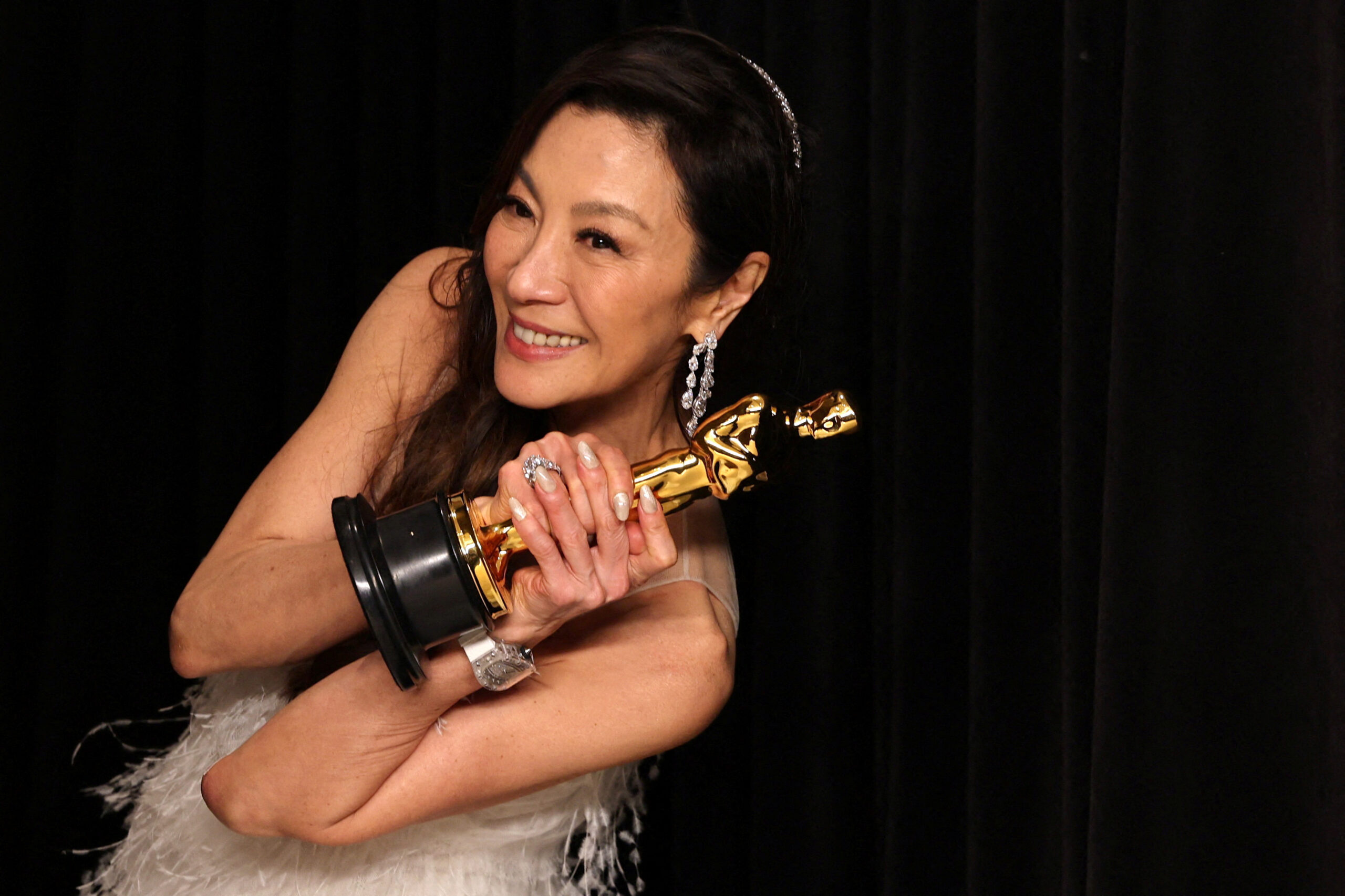‘She deserves it’: Chinese internet cheers Michelle Yeoh’s Best Actress Oscar
Chinese internet users reacted with joy after Malaysian-born Michelle Yeoh, a beloved actress in the country, became the first performer of Asian descent to win Best Actress at the Academy Awards.

Chinese social media erupted in congratulations on Monday after Michelle Yeoh (杨紫琼 Yáng Zǐqióng) took home the Best Actress trophy at the 95th Academy Awards for her multifaceted performance in Everything Everywhere All at Once, which also won Best Picture.
The 60-year-old Malaysian-born star became the first performer of Asian descent to win Best Actress in the awards show’s 95-year history. Yeoh was the second woman of color to take the category in two decades, following Halle Berry, who won the Academy Award in 2002 — and presented Yeoh with her history-making win on Sunday night at the Dolby Theatre in Los Angeles.
Yeoh received a raucous standing ovation from the crowd as she walked to the podium. “For all the little boys and girls who look like me watching tonight — this is a beacon of hope and possibility,” said an emotional Yeoh as she held her Oscar aloft at the ceremony. “This is proof that dream big and dreams do come true. And ladies, don’t let anybody tell you you are ever past your prime.”
She dedicated the award to “my mom — all the moms in the world — because they are really the superheroes, and without them, none of us would be here tonight.”
Everything Everywhere All at Once — the film Yeoh starred in as a time-traveling Chinese-American laundromat owner navigating her complex relationships with her husband and daughter — roundly swept the 2023 Oscars with a whopping seven wins in some of the biggest categories, including Best Picture and Best Director. Along with Yeoh, Ke Huy Quan won Best Supporting Actor and Jamie Lee Curtis won Best Supporting Actress.
In acknowledgement of the historic moment, Yeoh joyously said backstage at the Oscars press room: “So I really have to thank the Academy for acknowledging and embracing diversity and true representation. I think this is something that we have been working so hard towards for a very long time, and tonight we freaking broke that glass ceiling. I kung fu’d it out and shattered it.”
She added, “And we need this, because there are so many who have felt unseen, unheard. It’s not just the Asian community — this is for everyone who has ever identified as a minority. We deserve to be heard, we deserve to be seen, we deserve to have equal opportunities so we can have a seat at the table. That’s all we are asking for. Give us that opportunity, let us prove we are worth it.”
As a veteran actress of Malaysian Chinese descent, Yeoh has been a force in filmmaking for four decades. In the 1980s, when the Hong Kong action scene was dominated by male stars like Jackie Chan, Yeoh managed to infiltrate that world with her impressive commitment to stunt work and her emotive talent as an actor. After becoming a prominent figure in Hong Kong’s kung fu cinema, Yeoh gained global recognition for her stunning performance in Ang Lee’s Crouching Tiger, Hidden Dragon and the James Bond film Tomorrow Never Dies. In recent years, Yeoh has reignited her acting career in Hollywood with her integral roles in blockbusters like Crazy Rich Asians and Marvel Studios’ Shang-Chi and The Legend of The Ten Rings.
Although Everything Everywhere All at Once has not yet had an official release in China, Yeoh’s achievement reverberated through Chinese social media in real-time on Monday morning. On Weibo, a hashtag lauding her Oscars win has been viewed more than 180 million times. “She truly, deeply deserves all the success and acclaim she’s been getting,” a Weibo user remarked, while another person wrote, “I’m so happy for her! I’m so happy for us!”
Yeoh’s Oscars acceptance speech struck a special chord with female commentators on Weibo, who praised the actress for calling out gendered ageism in Hollywood.
“Many people feel ashamed about aging, especially in Asian culture and among women,” a music blogger with more than 4 million followers on Weibo commented. “I’m going to tell my mom about Yeoh’s win and let her know that there are endless possibilities for someone her age.”
The euphoria across Chinese social media largely stems from the fact that Yeoh is a beloved figure in the country and has talked positively about her Chinese heritage. In a 2004 TV interview with a Shanghai channel, Yeoh said in fluent Mandarin that although her family lived in Malaysia, she still saw herself as “Chinese” above all else. “As people of Chinese descent, we take pride in our aesthetics,” she said. “Since I was little I knew that I have to remember where my roots are from and who I am wherever I go and in whatever I do.”
The elation stood in stark contrast to the stifled cheers on Chinese social media in 2021 when Beijing-born filmmaker Chloé Zhao (赵婷 Zhào Tíng) became the first woman of color, the first Chinese woman, and the second woman ever to win the top directing prize at the Oscars with her acclaimed road-trip drama Nomadland. The director was initially hailed by Chinese state media as “the pride of Chinese people” when she won a Golden Globe for best director in March that year, but the praise evaporated with the surfacing of a 2013 interview in which Zhao talked about growing up as a teenager in China, which she referred to as “a place where there are lies everywhere.” Chinese state media didn’t report on Zhao’s Oscars victory, with social media posts applauding her win being censored. Nomadland has never been shown in China despite initial plans for a limited theatrical release.
Political controversy regarding China wasn’t entirely absent from this year’s Oscars. Prior to the ceremony on Sunday night, an online petition urging the Oscars to drop Donnie Yen (甄子丹 Zhēn Zǐdān) as a presenter garnered more than 100,000 signatures. In a letter attached to the petition, the Hong Kong action superstar is described as “a supporter of the Chinese Communist regime” who “has made several remarks in support of the Chinese government’s policies, including supporting the implementation of the National Security Law in Hong Kong and accusing Hong Kong protesters of being rioters.” The plea didn’t affect Yen’s appearance at the ceremony.
Donnie Yen, a Chinese People's Political Consultative Conference National Committee member, speaking at #Oscars despite 100,000 people petitioned to have him disinvited. Going to be great press for CCP news outlets. pic.twitter.com/N3EriXkZqp
— Kris Cheng (@krislc) March 13, 2023
After dominating much of the 2023 awards season, Everything Everywhere All at Once‘s Oscar trophy haul wasn’t entirely a surprise. Fred I. Lee, an associate professor of political science and Asian and Asian American studies at University of Connecticut, predicted the universe-hopping spectacular’s victory earlier this month on Twitter. He told The China Project that the thought came up shortly after Ke Huy Quan picked up a Screen Actor Guild award in late February.
“By this time, it was clear that the film had established itself as a critical darling,” Lee said. “I was just thinking to myself, ‘Well this is interesting. U.S. tastemakers really like this movie…is it despite or because it’s seen as a ‘Chinese American’ film?”
From the hit romantic comedy Crazy Rich Asians to Lulu Wang’s indie family drama The Farewell, as Hollywood and award bodies like the Oscars have tried to bolster inclusion and diversity in the industry, there has been a rise in Asian and Asian American representation in U.S. cinema. Now, with the critical and commercial success of Everything Everywhere All at Once, many believe that Hollywood will recognize more Asian actors and offer more opportunities for Asian filmmakers who are willing to take risks to tell stories on the big screen.
Hollywood’s inclination toward affirming “liberal multiculturalism” is a curious case for Lee, as the U.S. and China are locked in a rancorous tussle. The overwhelmingly positive reception of Everything Everywhere All at Once “was interesting against the backdrop of how most U.S. ‘China watchers,’ think tankers, and even social scientists speak about the People’s Republic of China: as challenge, threat, exotic, competitor, adversary, enemy, and the like,” Lee said.
“U.S. liberal multicultural nationalism is the sense that: ‘We, USians, can respect, recognize, and include ‘other cultures.’ Having transcended ‘our culture,’ we can — of course! — appreciate Chinese/Asian diasporic cultures,” Lee added. “If my theory is right, Hollywood does not want to associate Everything Everywhere All at Once with the PRC. Hollywood, so to speak, wants to claim the film is a ‘universal’ story, which is quite close in its imagination to saying it is an ‘American’ story.”
In his prediction tweet, Lee highlighted the dichotomy, writing, “So, the Oscars are the ‘love the Chinese (American) people’ part, while the U.S. government is ‘hate the CPC’ part.”
Asked to elaborate on his comment, Lee said that although it’s difficult to predict how U.S.-China relations will affect the recognition and appreciation for Chinese Americans in Hollywood in the long run, “Were I to venture a semi-educated guess: the need for the United States to affirm itself as a liberal-democratic society is not what it used to be, but Hollywood liberalism — in the sense of affirming ‘historical firsts,’ diversity and inclusion-type initiatives, and national-statist multiculturalism — is alive and well.”






